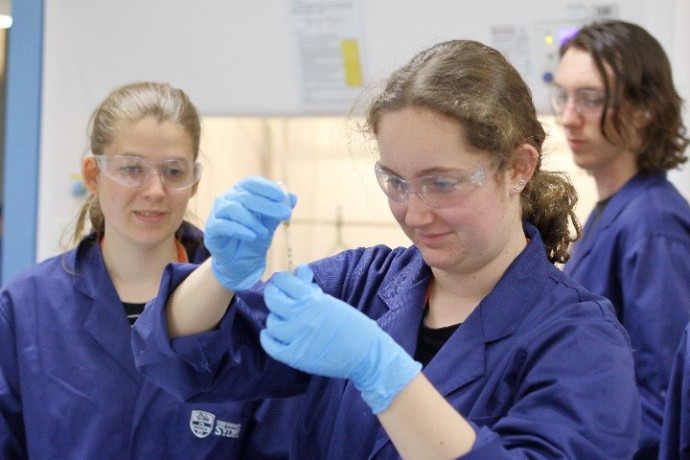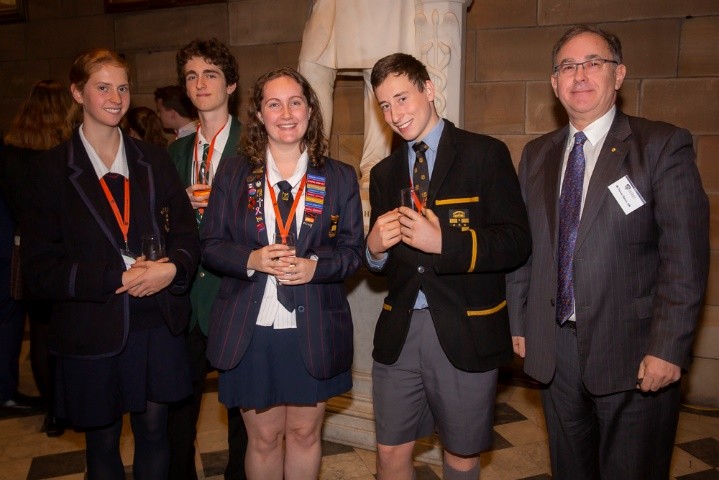Bridie McErlain

Bridie McErlain attended the Professor Harry Messel International Science School in 2019 and wrote a trip report following her return, reflecting on how the experience changed her life.
Having the opportunity to attend the Professor Harry Messel 40th International Science School (ISS) was quite easily the most incredible opportunity I’ve been given. Before leaving for Sydney I was quite anxious that I would be out of my depth and struggle to keep up with everyone else. As soon as I arrived and met a few of the other students my nerves were gone.
The first day mainly consisted of getting to know everyone we would be spending the next two weeks with, specifically room-mates and group members. As soon as I met my room-mates we instantly formed a strong friendship and have stayed in contact since returning home. Meeting the members of my group was amazing. I was truly overwhelmed by everyone’s passion and love for science. It was fascinating listening to everyone talk about their home lives and school systems where they were from. For me, a clear highlight of the trip was learning about all the different cultures and ethnicities of everyone involved in the ISS. It was also cool being able to share a little bit of New Zealand culture. Along with Honor, I taught a few friends some greetings in Te Reo Māori and the song “Tūtira Mai Ngā Iwi”.
Throughout the ISS I was constantly expanding my knowledge and learning about new concepts. With 17 lectures across the two weeks, there was no lack of ideas for potential future careers. One of the lectures that stood out to me was given by Matthew Abbott, a NASA flight director who's working on NASA’s newest human space exploration programmes. Abbott gave two lectures. The first focused on the history of space exploration as we neared the 50th anniversary of the Moon Landing. In his second lecture, Abbott gave us an in-depth explanation of how he’d come to be a flight director for NASA and what was involved in his job. I found this incredibly interesting, especially when he went into detail about the key attributes a flight director needed. Discipline, confidence, and teamwork being just a few of these. What shocked me was how similar these qualities were to those that I used in my everyday life, particularly with sport and performing arts. Learning this opened up my eyes to see how the everyday skills I was building at school could impact my future career. Listening to Abbott talk about Mission Control and the team of people involved enforced the idea that people are quite easily the most important aspect of any job. This was something I had been told before but had never truly acknowledged until now. Moving forward with STEM pathways I will definitely keep this in mind and apply it in as many ways as I can.

At the ISS 2019 Gala Reception with a few friends and Trevor Danos, ISS Alumni and Author of The Pursuit of Excellence: A History of the Professor Harry Messel International Science School. We were lucky enough to be gifted a copy of his book in our arrival pack. Left to Right: Mia Whalley (AUS), Lachlan Robertson (Australia), Bridie McErlain, Fergus Fisher (Australia), Trevor Danos.
Another set of lectures that caught my attention were the final two lectures. These were given by Alex Sen Gupta, a climate scientist and associate professor at the University of New South Wales (UNSW). He gave us two lectures on climate change. The first was about climate models and how they are created. He then gave us a demonstration of how data such as CO2 and methane levels can be used to create an accurate climate model that predicts how global temperature is expected to change. He then compared the rough model he had created with us to the model that had been created with state-of-the-art technology at UNSW. This was intriguing to see the similarities between the two models, even though one had been created within the hour and based on old data while the other was updated regularly as new data was made accessible. Sen Gupta was able to prove to us that both models worked. He did this by using data from the 1980s/90s and put this into the model. This then gave us an indication of the change in global temperature in that time period. Both models gave very similar values to the actual change in global temperature in that time period.
Sen Gupta’s second lecture focused on what would happen in the future with various scenarios. These included scenarios where we continued to increase carbon emissions at the rate they’re currently increasing, producing the same number of carbon emissions produced in 2018 per year, and decreasing carbon emissions per year. Climate change is an issue that I care very strongly about so to be able to see the scientific evidence around it was fantastic. The difference in the results of these models really showed the severity of the climate crisis if carbon emissions are not reduced. He then discussed ways we, as teens, were able to make an impact and reduce carbon emissions at home. Obviously, carbon emissions are not the only cause of climate change but it was reassuring to know that there were ways people could make a difference in their everyday lives.
On top of the lectures, there were 16 activities over the two weeks that we got to get involved in. Some of these, like chemistry and biology, were hands-on in a lab, while others such as psychology and ethics were discussion-based. There were so many learning opportunities in the activities, my personal favourite being the chemistry lab. The practical required us to identify unknown organic compounds by using multiple different techniques. This included Infrared Spectroscopy, Nuclear Magnetic Resonance, and others. We got to learn how to correctly use the software for Nuclear Magnetic Resonance and why accuracy was so important with these techniques.
Another activity I learnt a lot in was the tour of the Museum of Applied Arts and Sciences (MAAS). At MAAS they had a display about the Apollo program and the 50th anniversary of Apollo 11 landing on the moon. One of the displays was about Margret Hamilton and her software programming for Apollo 11. Being able to read and learn more about what Margret Hamilton had done was incredible. It allowed me to appreciate how lucky I am to be able to get involved in science without being held back by being a female. Our guide compared the photo of Margret Hamilton standing next to the code from the Apollo 11 mission to a more recent photo of Katie Bouman next to the stacks of hard drives used to create the first photo of a black hole. To be able to step back and appreciate how far science and technology had come in 50 years was something I’ll never forget. There is an entire galaxy of possibilities for science and technology in the future and I’m looking forward to it.
Overall the International Science School was the best opportunity I have ever been offered. It allowed me to experience so many different things, from science to university life and so much more. It also allowed me to move on from issues with my mental health by giving me a much clearer idea of what my future might hold. I’m very excited to take this knowledge I gained from the ISS and incorporate it into my life as I continue on in STEM pathways. Thank you so much to the Royal Society Te Apārangi for giving me this opportunity that truly changed my life.

Back Row: Bailey Lissington, Bridie McErlain, Alexander Barnes. Front Row: Maddison McQueen-Davies, Honor Browne, Emma Hutchinson, Her Excellency the Honourable Margaret Beazley
Q&A
Did attending this event increase your knowledge of diverse career paths in science and technology?
Yes, I was blown away by how many different pathways one was able to take by simply completing a Bachelor of Science. A standout activity for me was “A Hypothesis of Scientists.” This reminded me of primary school sciences fair, just on a much higher scale. A group of 20+ Undergraduate and Postgraduate Students from the University of Sydney came in to talk to us. They all had demonstrations of their research that they were currently working on and I loved being able to ask questions. My questions ranged from simple ones such as how they got into their research, to some quite complex ones around how their research could be used to change science and technology. The lectures also showed me how there were diverse career paths even within science majors such as physics. ISS has left me with a long list of future possibilities that I can’t wait to look at in more detail.
Has attending this event enthused you to go on to pursue a science and technology career?
Yes, ISS confirmed for me that a career in STEM was definitely what I wanted to do. I’ve always wanted to get involved in a career that allows me to help people, ever since I was about seven or eight. For a long time, I thought the only way to combine both this and STEM was through medicine, defence force, and other similar pathways. ISS allowed me to see other, less obvious, ways of helping people through STEM. One example that surprised me was our activity at the Virtual Reality Lab at the School of Psychology. The scientists there were using VR technology to replicate high-stress scenarios such as car crashes and monitoring how the human nervous system responded to that situation. They found that VR experiences bought out the same response as the real experiences. They had also been working alongside NASA developing programmes to prepare astronauts for space flights and zero gravity. They’re planning on using VR to treat issues such as Post Traumatic Stress Disorder and extreme phobias. As someone who has lived in Christchurch and seen PTSD manifest in those around me as a result of the earthquakes and mosque attacks, it was astounding to see how this technology could help combat that and help people.
Has attending this event changed the way you feel about science and technology?
No. I don’t think attending this event changed the way I feel about science and technology but rather enhanced and confirmed what I already felt about science and technology. Moving forward, science and technology will have a big impact on human life but it has its consequences. I feel science and technology can have a positive impact on the lives of people but only if it is monitored carefully and follows ethical guidelines. ISS definitely confirmed this for me, specifically with the ethics and leadership workshop.
Has attending this event and meeting like-minded students been of benefit to you?
Yes. The most enjoyable part of the entire trip was getting to know everyone and engaging in some incredible conversations with like-minded individuals. I built many strong relationships with those I met, and I am sure they will last a long time. Being able to talk to people who shared similar passions to me was awesome. I really enjoyed having challenging conversations around the ethics of certain scientific advancements and overall being able to discuss science in more detail than I am able to at school and home.
